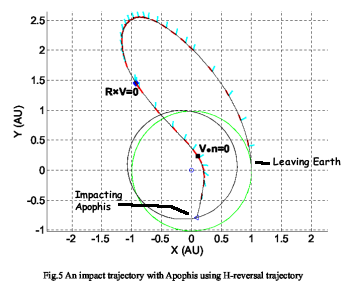Using a solar sail to deflect an earth-destroying asteroid

In a paper published today on the Los Alamos astro-ph preprint website, two Chinese scientists have proposed using a solar sail for deflecting any asteroid that happens to be aimed at the earth. The diagram to the right is their simulated mission to impact the asteroid Apophis, which will pass close to the earth in 2029 and — depending on whether that flyby puts it through a very small 600 meter-wide mathematical “keyhole” — could then return in 2036 on a collision course.
The idea is to use the sail to slow the spacecraft down enough so that it starts to fall towards the sun. The sail is then used to maneuver it into a retrograde orbit. When it impacts the asteroid the impact will therefore be similar to a head-on collision, thereby imputing the most energy in the least amount of time with the least amount of rocket fuel. In their Apophis simulation, a mission, weighing only 10 kilograms (about 22 pounds), launched around 2025, and hitting the asteroid in this manner in 2026, would deflect its flyby in 2029 enough to guarantee it will not fly through the “keyhole” and therefore eliminate any chance of it hitting the earth in 2036.
Obviously many questions must be answered before such a mission should fly.
For example, we need to know more about Apophis, or any target asteroid for that matter, in order to determine the best way to deflect it. If the target asteroid is a rubble pile rather than a solid object, an impact like this might simply disperse the material instead of deflecting it, thereby making things worse.
In addition, a lot more engineering work and testing of solar sails is required. At this time, only one solar sail, the Japanese sail Ikaros, has ever been successfully launched, flown, and maneuvered in space. The authors of the above paper themselves admit that such a mission requires “a high performance solar sail,” with a very large area as well as a very sophisticated “navigation, guidance, and control system.” Otherwise, even the smallest error could “make the sail miss the asteroid.”
What I find most fascinating about this proposal, however, is how it illustrates the versatility and maneuverability of solar sails. Properly designed, they could easily make travel throughout the inner solar system fast and easy.
On Christmas Eve 1968 three Americans became the first humans to visit another world. What they did to celebrate was unexpected and profound, and will be remembered throughout all human history. Genesis: the Story of Apollo 8, Robert Zimmerman's classic history of humanity's first journey to another world, tells that story, and it is now available as both an ebook and an audiobook, both with a foreword by Valerie Anders and a new introduction by Robert Zimmerman.
The print edition can be purchased at Amazon or from any other book seller. If you want an autographed copy the price is $60 for the hardback and $45 for the paperback, plus $8 shipping for each. Go here for purchasing details. The ebook is available everywhere for $5.99 (before discount) at amazon, or direct from my ebook publisher, ebookit. If you buy it from ebookit you don't support the big tech companies and the author gets a bigger cut much sooner.
The audiobook is also available at all these vendors, and is also free with a 30-day trial membership to Audible.
"Not simply about one mission, [Genesis] is also the history of America's quest for the moon... Zimmerman has done a masterful job of tying disparate events together into a solid account of one of America's greatest human triumphs."--San Antonio Express-News


Helen America….call your office.